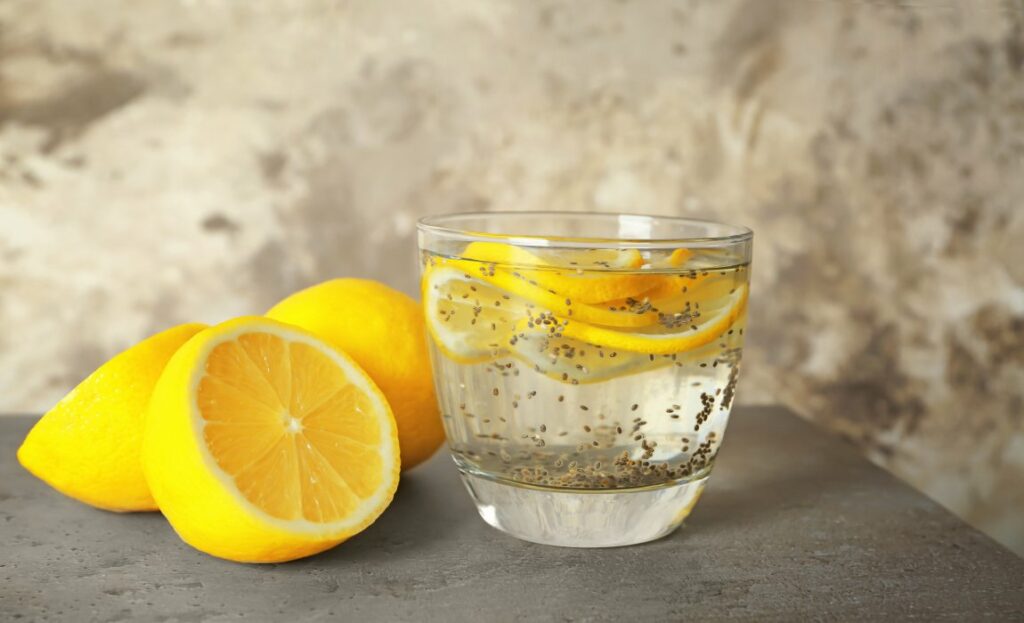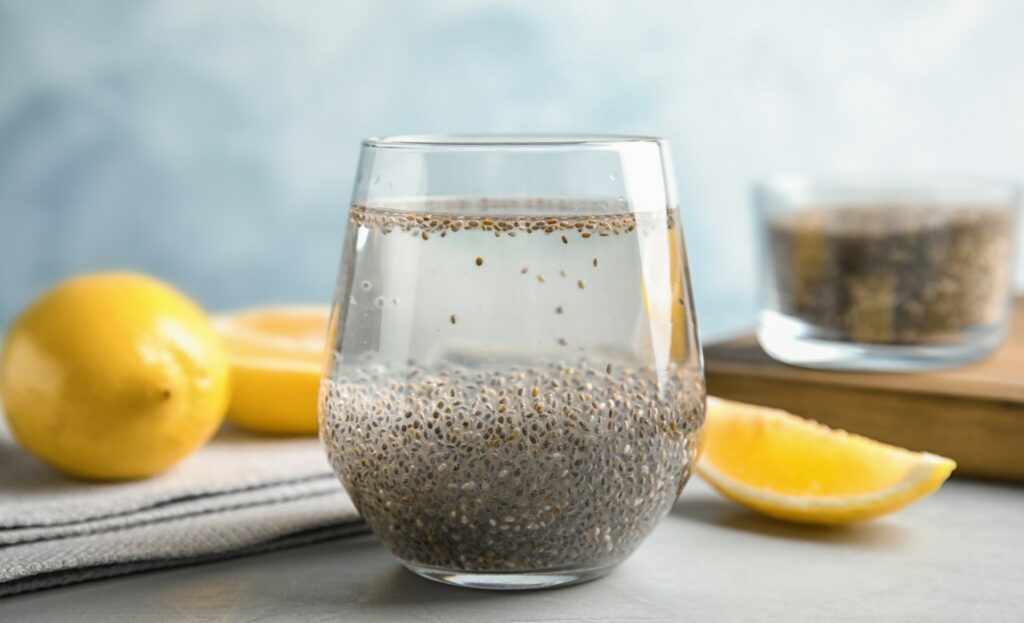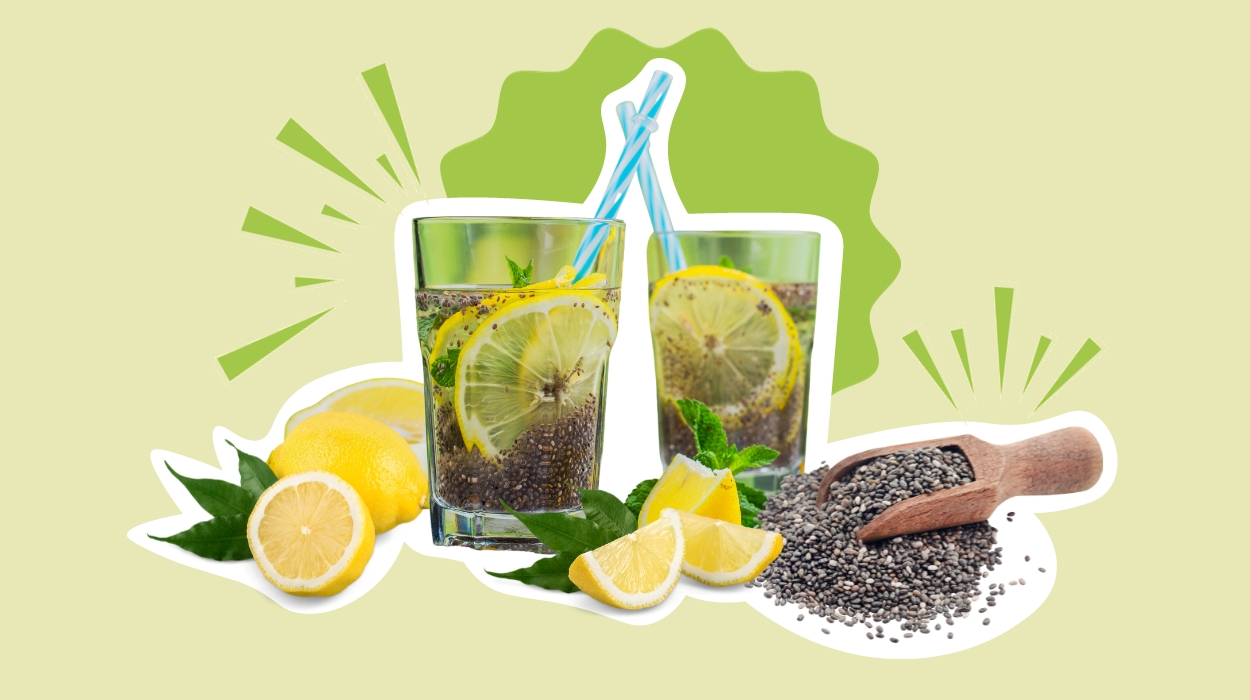Lemon water has long been hailed as a go-to drink for various health benefits, from weight loss to detoxification. In addition, its refreshing taste and natural properties make it popular for those seeking optimal health.
However, did you know that you can take the goodness of lemon water to the next level by incorporating a simple ingredient – chia seeds? Packed with fiber, these tiny seeds can amplify lemon water’s already impressive health benefits.
This article will explore how combining lemon water and chia seeds can contribute to weight loss. We will also look at other noteworthy topics, such as the best CBD gummies for weight loss and the potential benefits of chia seeds in achieving a healthier lifestyle.
So, let’s dive into the world of lemon water, chia seeds, and their impact on weight loss and overall well-being.
Lemon Water And Chia Seeds
Lemon water and chia seeds are an incredibly easy-to-make and beneficial duo that can improve your health in many ways. Some of the most notable benefits of this amazing combination are:
- Boosts immune system.
- Increases body detoxification.
- Aids natural weight management.
- Improves heart health.
- Promotes bone and muscle health.
- Regulate blood sugar levels.
- Nurtures brain health.
- Aids in optimal nutrient absorption.
- Promotes mental well-being.
Benefits Of Chia Seeds And Lemon Water

Combining lemon water and chia seeds offers various health benefits. It’s more than just a refreshing drink; it’s a wellness potion that harnesses the power of nature’s best nutrients. As always, moderation is key, and a healthcare provider’s advice should be sought out for personalized recommendations. Below are some benefits associated with this stellar combo:
Boosts Immune System
The antiviral and antibacterial properties[1] of lemon and the fiber and healthy fats such as omega-3 fatty acids in chia seeds make this combination a formidable shield against common ailments. This natural barrier may help reduce falling ill, especially during seasonal changes when the body is more susceptible to infections.
Increases Body Detoxification
The powerful combination of chia seeds and lemon water offers a detoxifying effect. The high fiber content of chia seeds aids in promoting a healthy gut,[2] facilitating regular bowel movements, and helping to excrete toxins from the body. The citric acid in lemons assists the liver[3] in its detoxification processes, enhancing the body’s natural ability to cleanse itself.
Promotes Natural Weight Management
Combining lemon water with chia seeds could be a strategic dietary move for those aiming to manage their weight. The soluble fiber in chia seeds expands in the stomach, promoting a sense of satiety and reducing snack cravings and potential overeating.
Additionally, the polyphenols found in lemon have been linked to reduced weight gain and fat accumulation.[4]
Improves Heart Health
Chia seeds are rich in omega-3 fatty acids,[5] and are known for their heart-protective properties. As a result, they work to reduce inflammation and lower cholesterol levels, both essential in maintaining heart health.
Lemons contain a good amount of heart-healthy potassium and vitamin C, further boosting the cardiovascular benefits of this combination.
Promotes Bone And Muscle Health
Both lemon and chia seeds are excellent sources of calcium. This important mineral is essential for maintaining strong bones and teeth.
Additionally, the magnesium found in chia seeds[6] supports muscle function and nervous system health, highlighting the musculoskeletal benefits of this nutritious duo.
Regulates Blood Sugar Levels
The high fiber content in chia seeds and the natural fructose in lemon can help stabilize blood sugar levels. This is especially beneficial for those with diabetes, as this combination can prevent spikes and crashes in blood sugar levels, helping to manage symptoms of hyper- and hypoglycemia.
Nurtures Brain Health
Omega-3 fatty acids in chia seeds and the essential nutrients in lemon can contribute positively to brain health[7]. These nutrients support cognitive function, boost mood, and slow down mental decline.
Aids In Optimal Nutrient Absorption
Vitamin C in lemons can enhance your body’s ability to absorb other essential nutrients, like iron. Consequently, incorporating lemon water with chia seeds into your diet could increase the overall bioavailability of nutrients from your meals, maximizing their health benefits.
Promotes Mental Well-Being
Enriched with tryptophan, chia seeds are crucial in fostering serotonin production, our body’s “feel-good” neurotransmitter. This attribute, combined with the revitalizing essence of lemon, can significantly enhance mood and boost mental well-being.
However, it’s vital to acknowledge our bodies’ distinctiveness and varied reactions to dietary changes. Each person has unique dietary needs and health objectives to fully benefit from the positive effects of chia seeds and lemon water.
Can You Add Chia Seeds To Lemon Water?

Incorporating chia seeds into lemon juice concocts a refreshingly tangy and nutrient-rich drink that’s not just delightful to taste but also beneficial for health. The combination contributes significantly to heart health, improved brain function, and overall wellness.
Integrating these tiny nutritional powerhouses into a simple lemon drink multiplies the health benefits, making it an excellent choice for a healthful beverage.
To prepare this wholesome drink, you must start preparing chia seed gel. Chia seeds have a unique property to absorb water and swell up, forming a gel-like consistency.
This is achieved by soaking chia seeds in lemon water for a few hours, ideally overnight. This not only makes them easier to consume but also aids in the release of their nutrients.
How To Make Lemon Chia Seed Water?
Creating your Lemon Chia Water is an easy and rewarding process. Here’s a step-by-step guide to making this nutrient-rich, hydrating beverage:
- Initiate the process by immersing a tablespoon of chia seeds in a glass of water. These seeds will swell up within a few minutes, forming a jelly-like texture or chia seed pudding.
- As the chia seeds transform, squeeze the fresh juice out of a lemon into a separate glass.
- Add a spoonful of apple cider vinegar for a dash of zest and additional health advantages. This ingredient is known to promote potential weight loss, among other benefits.
- Consider enhancing your lemon water with a natural sweetener. Maple syrup is a great choice.
- Once the chia seeds have fully bloomed (typically taking about 15-20 minutes), mix them with the lemon water.
- Blend the mixture thoroughly to ensure a consistent taste and texture throughout the drink.
Conclusion
By incorporating chia seed water into your daily routine, you can enjoy numerous refreshing benefits. Whether you prefer warm or cold, Lemon Chia Seed Drink can be easily prepared in advance, ensuring you have a convenient and nourishing option for a healthy and refreshing beverage.
It is suitable for individuals of all ages, including children, provided there are no specific allergies or sensitivities. Customization is key when it comes to this drink.
You can experiment with different natural sweeteners and even add other complementary ingredients like ginger, mint, or cucumber slices to tailor it to your taste preferences and nutritional goals.
Frequently Asked Questions
You can prepare the Lemon Chia Seed Drink in advance. However, it’s best consumed within 24 hours to maintain the freshness of the lemon slices and the texture of the chia seeds.
Yes, you can substitute agave syrup with any sweetener. Honey or maple syrup are excellent natural alternatives.
While unnecessary, soaking chia seeds allows them to expand and become more gelatinous, enhancing the drink’s texture.
Yes, this drink is vegan-friendly. All ingredients, including agave syrup as a sweetener, are plant-based.
While there’s no strict rule, consuming it a few times a week can help you reap the benefits. However, always consult with a healthcare provider for personalized advice.
This wholesome drink is suitable for children. However, monitoring any potential allergies or sensitivities to the ingredients is essential. Additionally, consider adjusting the sweetness level based on their preferences and dietary requirements.
While fresh lemons provide optimal flavor, you can substitute high-quality bottled fresh lemon juice. Look for a reputable brand without added preservatives to maintain the nutritional benefits and taste of the drink.
Feel free to experiment and personalize the Lemon Chia Seed Drink by adding ingredients like ginger, mint, cucumber slices, or even a sprinkle of cinnamon. These additions can provide extra flavor and boost the drink’s nutritional profile.
 Expert's opinion
Expert's opinion
